

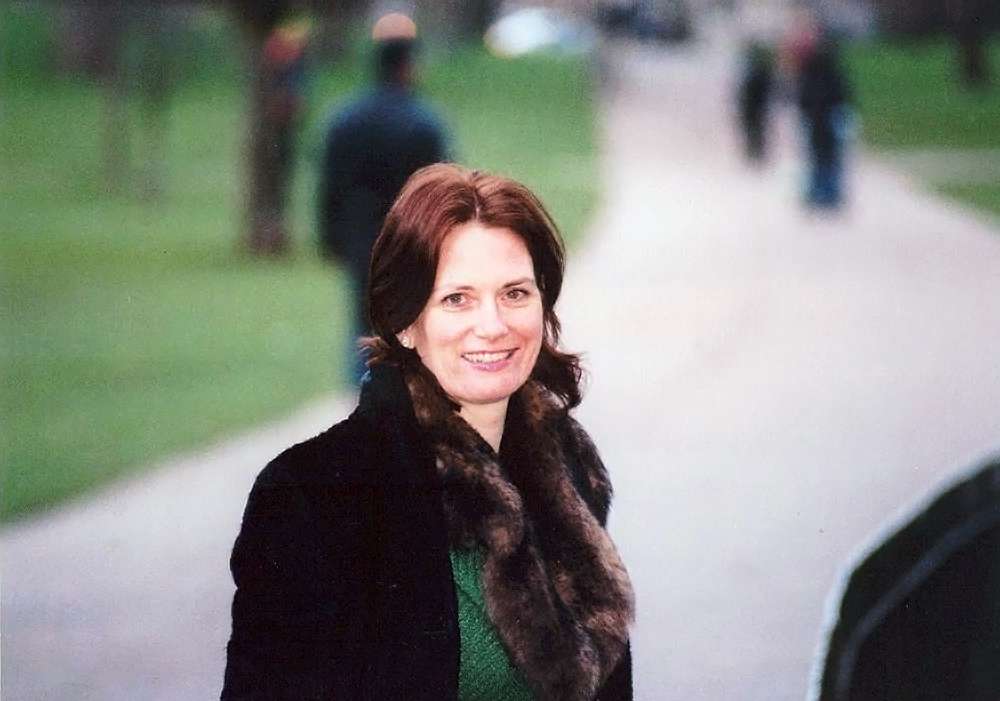
SUSAN SINGLETON
Solicitor
Susan Singleton is a solicitor and practises through her own firm of solicitors in the commercial, competition and intellectual property law area. After training at London solicitors Nabarro Nathanson (now CMS Cameron McKenna Nabarro Olswang LLP, trading as CMS), immediately on qualification as a solicitor she moved to the EC/Competition Department of leading City law firm Slaughter and May, solicitors and thereafter the London intellectual property law specilalist solicitors' firm Bristows, until founding Singletons, Solicitors. She has advised many major public companies in the UK and abroad.
She has served on the Contracts Group (formerly known as the Legal Committee) of the Chartered Institute of Purchasing and Supply and was responsible for updating of the CGI (previously CIPS) IT Model Forms of Contract.
Vice Chairman of the Competition Law Association until 2016, Susan Singleton is author of about 33 law books, has contributed to about 48 others and is a frequent writer in her field. Recent books have included Commercial Agency Agreements (Bloomsbury 5th ed 2020), Buying and Selling Private Companies and Businesses (11th edition, Beswick and Wine, Bloomsbury Publishing, 2022), Joint Ventures and Shareholders' Agreements, 6th edition 2021, Bloomsbury Publishing (7th edition to be published 2025), and books on competition, data protection, and internet law including Business, the Internet and the Law. She wrote the 5th edition of the book E-Commerce and Convergence: A Guide to the Law of Digital Media (published 2021).
She has updated LexisNexis' Encyclopaedia of Forms and Precedents (i) Partnership Vol. 30(1), 2025 (ii) Advertising and Marketing Vol. 1, 2025, (iii) Services Vol. 12(1)(B), 2025, (iv) Information Technology Vol. 19(1),2024, (v) Telecommunications part of Vol. 39(1), 2024, (vi) E-Commerce Vol 13(3), 2023, (vii) Confidentiality, Vol. 12(3), 2022, (viii) Data Protection and FOIA Vol. 12(2) (A) and B) - narrative sections, 2020.
She follows general commercial law developments closely. She has been a frequent speaker at UK and international conferences in this area and has spoken at about 1700 legal conferences. Until 2020 she was the editor of the three volume Graham & Trotman looseleaf Comparative Law of Monopolies.
FIND OUR BOOKS
See Susan Singleton's "Author Page" on Amazon and her author video.
On the intellectual property side she edits/publishes/owns the subscription newsletter IT Law Today, the UK's oldest IT law journal (published since June 2010 by Singlelaw) and also publishes Finance and Credit Law newsletter available on subscription. These were acquired from previous publisher Informa plc in 2010.
She also publishes 4 other legal journals also acquired in 2013 from Informa plc making the Singlelaw publications a stable of, now, six legal journals (see links on the home page of this site). She is a contributing author to Company Secretaries and Directors Guide published by Croner-i and other publications. She regularly updates parts of the Oxford Dictionary of Law - the 4th edition (1997) and 5th, 6th, 7th. 8th, 9th and 10th (2021) editions.
She sat on the EC Laws Committee of the Licensing Executives Society and until 2010 sat on the Board as an Independent Member of the Direct Marketing Authority.
Profiles of Susan Singleton
1A From "Solo", Magazine of Sole Practitioners Group, Law Society - Spring 2023
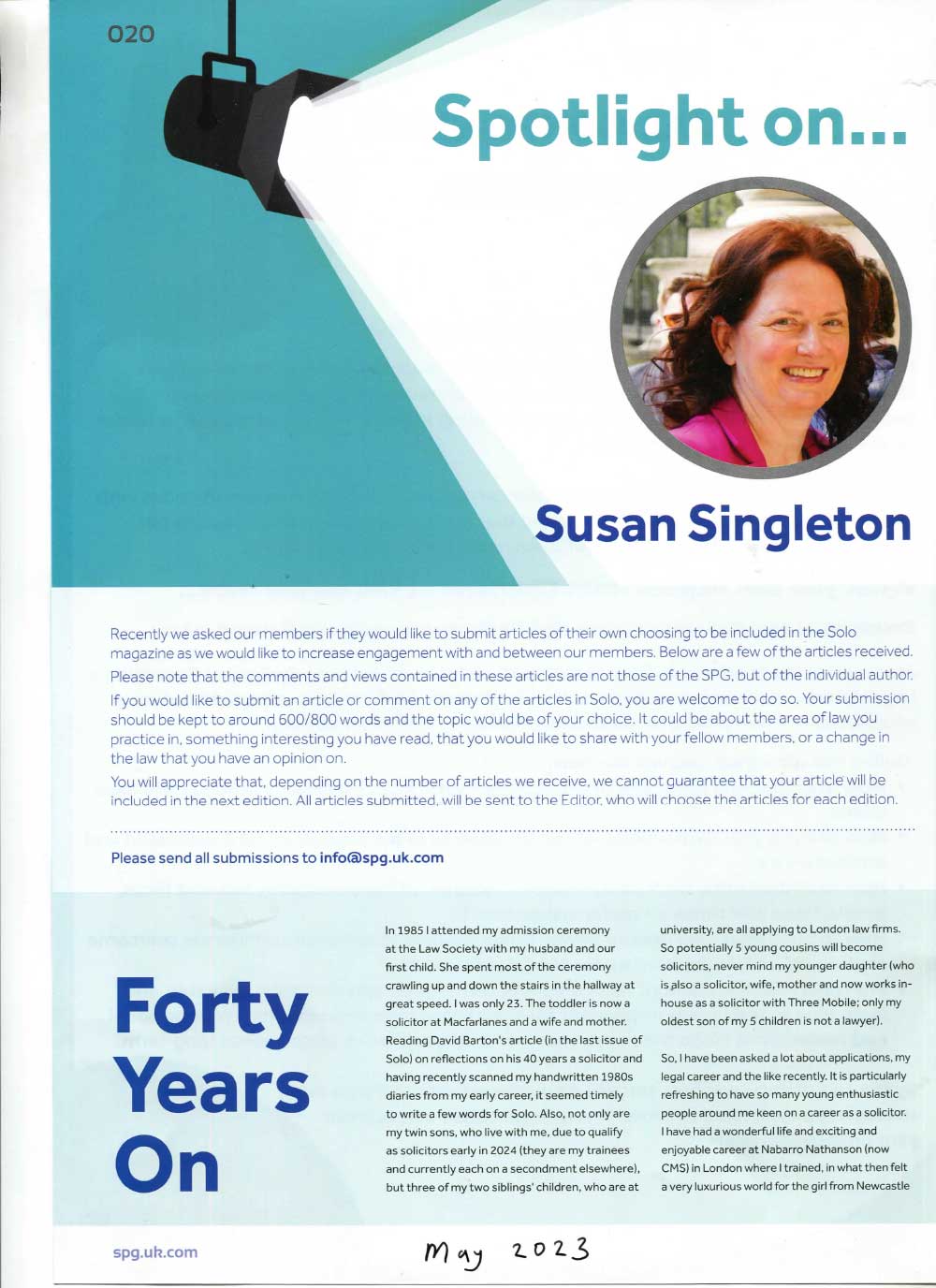
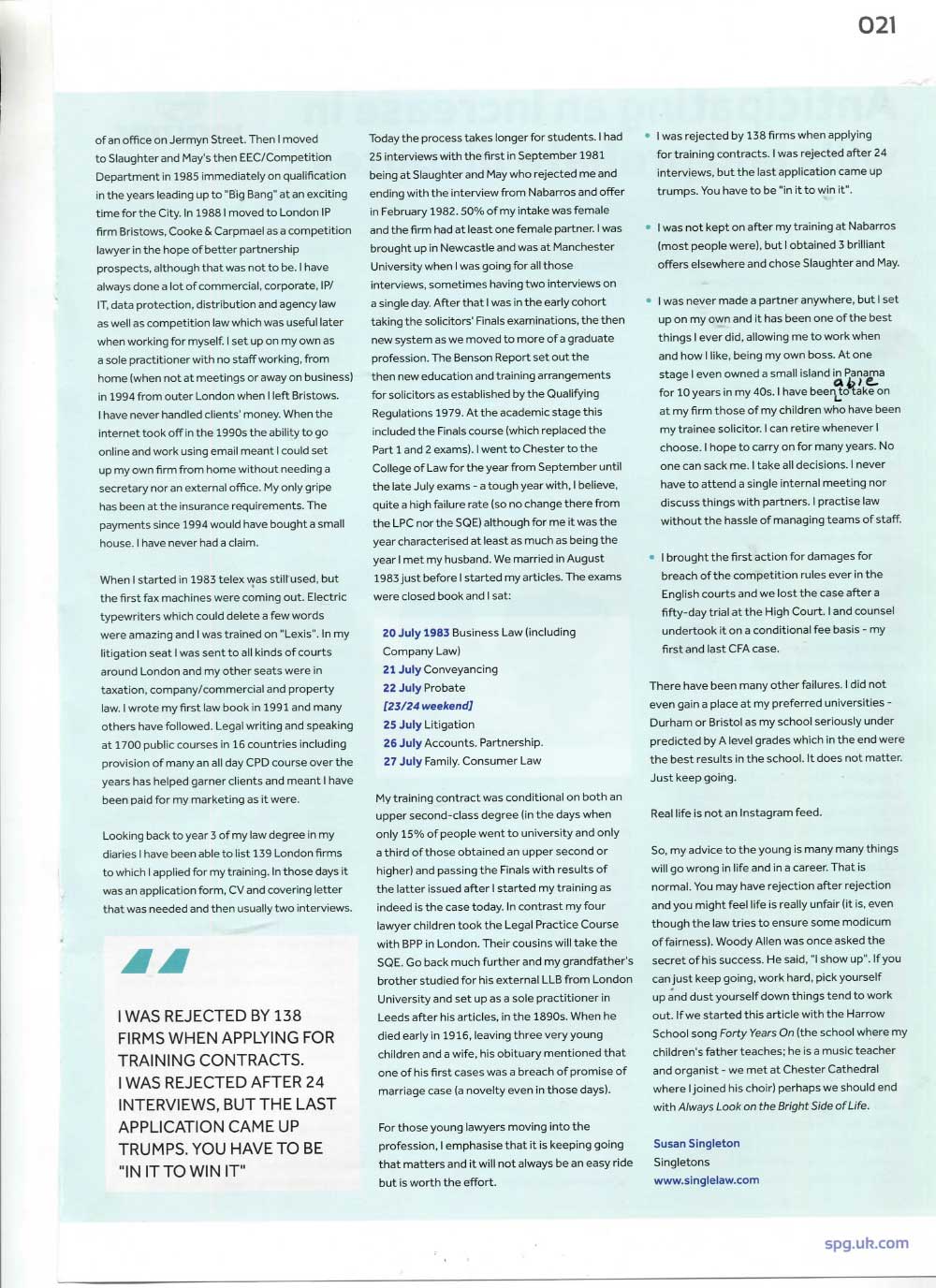
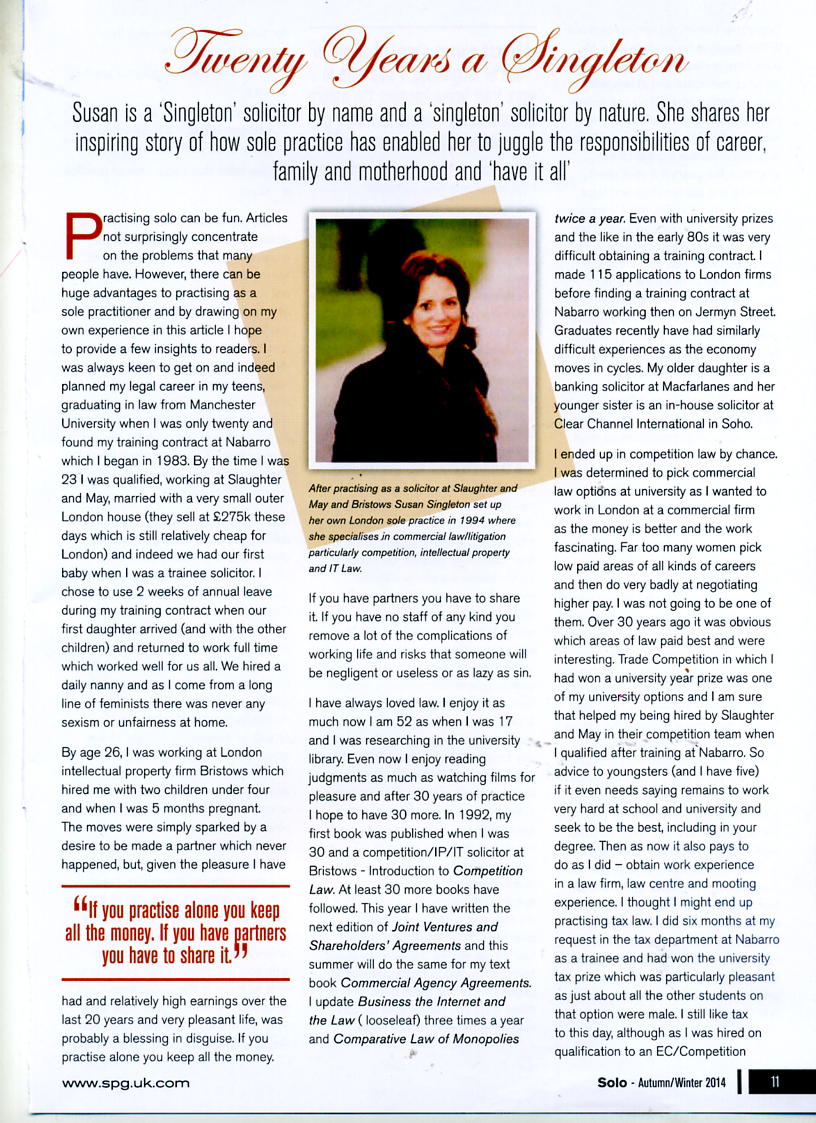
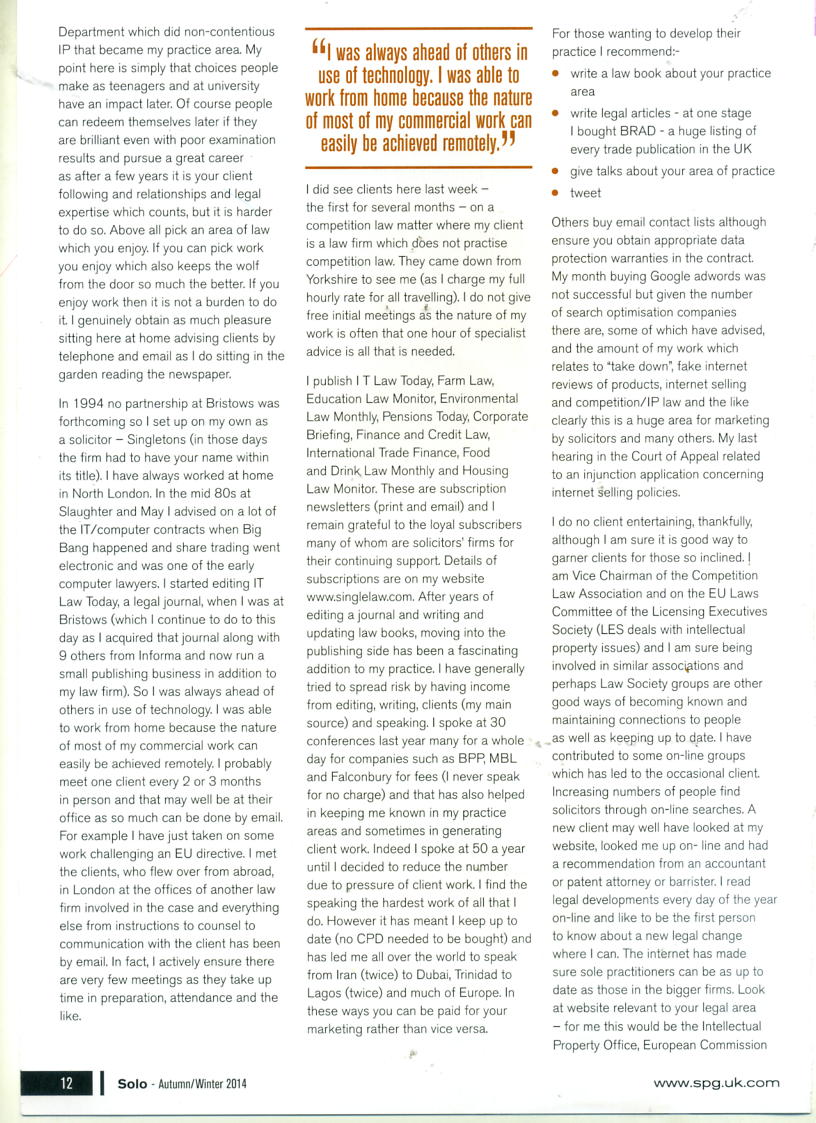
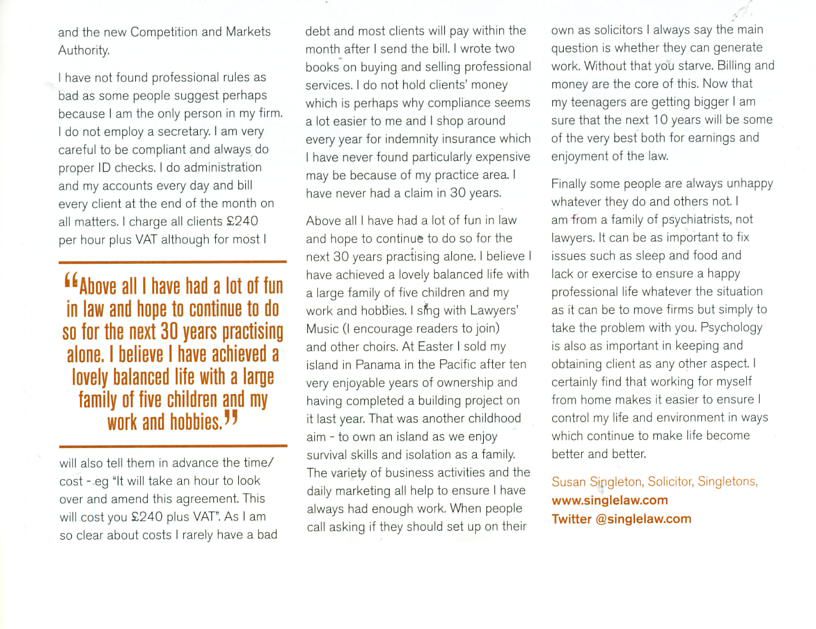
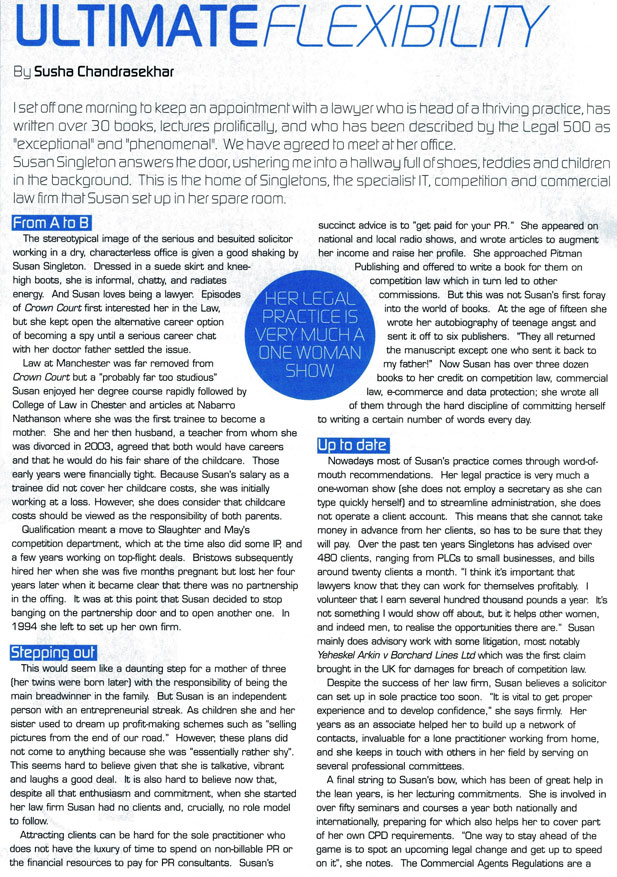
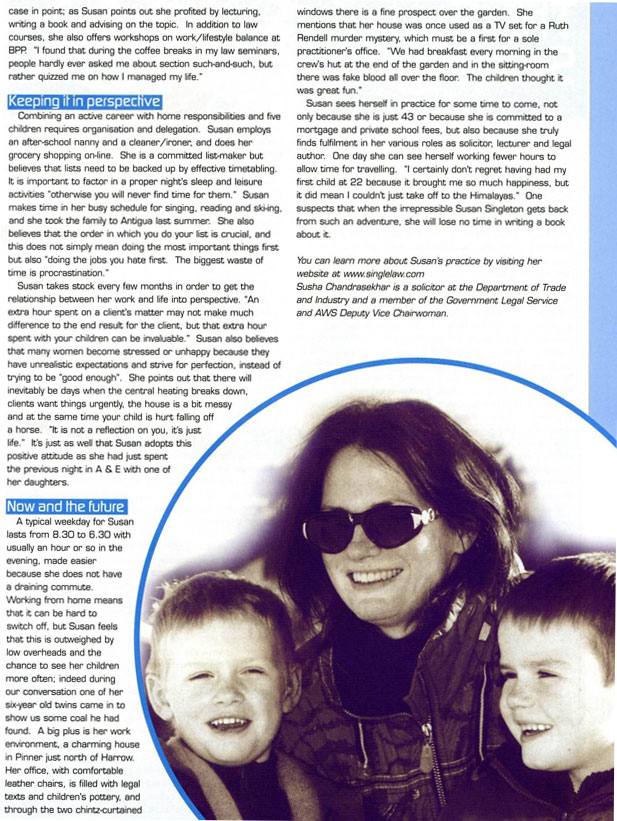
2. (Above from AWS (Association of Women Solicitors) Magazine LINK - 2005)
3. "IT Girl or Wonderwoman?" (Law.com 1 June 2000)
Susan Singleton
Leading IT lawyer Susan Singleton tells Chris Dignan of law.com how she risked leaving a big firm to go-it-alone - while bringing up five children.
Susan Singleton went back to work just two weeks after giving birth to her first child because she believed maternity leave was 'sexist'. She was 22 and was doing her articles at Nabarro Nathanson. Today, she has five children, is 38, and has left the comfort and support as a firm's employee to become a successful leading lawyer in her field, working solo from home. Singleton is unconventional, undaunted and hugely energetic which becomes infectious to most people she meets. She gives the impression that nothing is too difficult, with an enthusiastic smile rather than an arrogant declaration.
From her office window, she overlooks the family's large garden, in contrast to the bustling streets and grey buildings she could see from her desk when working for London firms. Her small office, lined with journals, is based in a ground-floor room in the family's large country home on Pinner Hill, Middlesex. No reception area dipped in chrome and marble with a team of stern-looking security guards waiting for you. Just walk up to the front door and knock and enter a family home. She sits behind her tidy desk and PC, children playing somewhere in other rooms, glancing at a diary full of appointments and deadlines for journals. 'I was the only trainee Nabarro had taken on who gave birth during their articles,' she says. 'I didn't take maternity leave because I thought it was sexist. It sounds very radical and will not please a lot of women. I didn't want time off.'
Inspired by television programmes about lawyers, such as Crown Court, she went into law after her father suggested she might like it. She worked at the property, taxation, litigation and commercial departments before qualifying in 1985 and going to Slaughter and May's EU and competition department where she learned from high-calibre lawyers. Three years later, it was off to Bristows where she forged her reputation as a copyright lawyer and began to write articles for specialist journals. However, with no partnership on the horizon, Singleton decided to risk everything and take the plunge by setting up her own practice in 1994. 'I didn't know anyone who had done this before so there was no-one's example I could follow. I just read a Law Society book on the subject and did it. I had no clients and earned money initially from writing articles.'
It was not long before she was in demand for her specialist knowledge in copyright and IT law. She is also thankful that the IT volcano had erupted by this time so her timing could not have been better.
The fact that she works on her own from an office in deepest Pinner without being part of an impressive firm does not deter clients either. 'People in this area are used to other people in their business working on their own, and many clients are young and so not conditioned by years of dealing with lawyers in massive firms.'
Today, she is ranked by Chambers & Partners as a leading IT/ computer lawyer, is editor of IT Law Today; Trading Law and Trading Law Reports; Comparative Law of Monopolies; and Purchasing and Supply Briefing; as well as writing for a host of other publications and being a guest on Radio 4 programmes.
So, surely, now that she's proved that she doesn't need a firm to be a success, she can take as much time as she likes off. 'Yes. I take one week's holiday a year. I really enjoy what I do ' it is my hobby. (She worked until 1.30am the day of this interview). I know I could take more time off if I wanted to, but it does not feel as though I am being forced to work late like perhaps I would if I was working at a firm. It is my choice. 'Because I am working from home, I can always take a small break and see the children, even if I am working, so I can see them whenever I like.'
Last year, Singleton had two twin boys, to add to her other children aged 15, 13 and 11. Full-time motherhood without working has never appealed. She employs a nanny and cleaner and enjoys the best of both worlds. 'I think it is much harder work staying at home with children all day. I would much rather write an interesting article on internet law than scrape remains off a saucepan. I like being with my children but don't want to be with them all the time.' Her dedication to work, impressive CV, client list and general success could create impression that she is a hard person. Far from it. She rarely stops smiling, is interested in gossip and is highly affable and charming. She met her music teacher husband, Martin, when he was a choirmaster and she sang at Chester Cathedral during law school. Singing and writing are two of her other passions. She dreamt of being a novelist if she hadn't been a lawyer and has written one or two books (as yet unpublished). The nearest she came to that a few days ago was when her home was used for the filming of a Ruth Rendell story. "
4. Written for Bloomsbury Professional - who publish many of my law books - Q&A with Susan Singleton - September 2019
- What first attracted you to the law?
I chose law when I was 14. I read a lot of books particularly autobiographies as a teenager and lawyers often appeared in the books. It sounded an interesting long term career. My father (an NHS psychiatrist in Newcastle upon Tyne) did a lot of work as an expert witness in court working with solicitors who needed a medical report for their cases and also sat on Mental Health Review Tribunals so that also helped make me interested in the legal profession. He was often having to go out to Durham prison to see prisoners with mental health issues. My father’s uncle who died in 1917 was a solicitor in Leeds with his own practice although that was long before I was born. He qualified in 1892 and his first case was one for a breach of promise of marriage.
I also knew it would be intellectually fascinating and there was a clear, defined career path into it too and in commercial law in London. It is also well paid. It was one of the best decisions I ever made.
- What is the most challenging aspect of your job?
It is all fairly easy these days now that I work for myself since founding my own firm of solicitors in London and I am based in my home office so even getting to work is very simple. Balancing different clients’ deadlines sometimes is difficult but I have tried to cut out unnecessary meetings which helps.
It was difficult when the children were babies feeding them at night (none of our five children ever seemed to sleep much) and then getting up to go to work full time although we both found work a nice break from childcare at times. At one point we had a brand-new baby, a one-year-old and a three-year-old and both worked full time.
For those starting out setting up on their own as a solicitor I always say the hardest issue will be whether you can generate any clients. I started my firm with no clients, just a few paid writing/ editing and speaking assignments and contracts and built it up from there. Without the legal writing particularly a paid editorship of IT Law Today monthly journal I am not sure I would have been able financially to take the risk of setting up on my own as we had three children to keep and a very large mortgage.
- What advice would you give someone starting a career in law today?
Do it. It is very rewarding as a career. Gain the best exam results you can at school and at university. I took part in moots at university and spent two years doing weekly volunteering in the university law centre during my law degree and at school I did a fair bit of speech and drama as well as lots of writing. I even typed five 50,000-word books in my teens, none of which anyone would publish, but it was very good experience for being a solicitor where writing contracts and writing advice for clients does require good spoken and written English.
Most of all plan your career. Solicitors’ firms recruit a number of years in advance. You will probably be applying for law firm paid vacation schemes in the Autumn of year two of your degree for the following summer and then 12 months later applying for training contracts (or their new equivalent after 2021 when qualification rules change for solicitors). Similarly if you go to the bar apply early.
Do not tie yourself down to an area of law too early at university. Keep an open mind. You might think criminal law sounds interesting because that is what you saw on television series you loved but there are lots of other areas of law out there worth a look.
- How do you think Brexit will affect commercial contracts?
I have given hour webinars on this topic. The short answer is always consider it carefully and in many contracts include a clause about Brexit. Looking at one small area only, I give a lot of competition law and intellectual property law advice particularly about export and imports of items protected by trade marks and other IP rights. The EU rules on free movement of goods and exhaustion of rights as regards the UK will be affected by Brexit. The Intellectual Property (Exhaustion of Rights) (EU Exit) Regulations 2019 ( SI 2019/265) come into force on exit day and provide that goods protected by IP rights can come into the UK from the EU/EEA where the rights owner put them on the market in the EU, whereas it will not work the other way round unless the EU27 decides otherwise. So there may be some scope for UK IP rights owners being able to stop exports from the UK and thus maintain different prices more easily. That is one example of hundreds of legal areas each of which will need to be examined on a case by case basis from public procurement rules affecting public sector contracts to the Data Protection Act 2018.
- What would you be if you weren’t a solicitor?
- Maybe a writer. I have written 30 law books so perhaps could have been an author of a different kind.
- Maybe a speaker. I have given 1700 law talks since 1991 on law all over the world including Iran, Dubai, Nigeria and much of Europe and were I to choose a different career I might have spoken about different topics from law. I have also taken part in a fair number of television and radio interviews over the years, most about the law or parents balancing work and home life.
- Possibly a singer. I took a deliberate decision not to go into music professionally when I was younger. I did a fair bit of professional choral singing and still play the piano and sing every day. I am glad I kept it as a hobby as it is quite hard to make a living in it (my children’s father is an organist) and one of the most important aspects of my life has been having five children whilst working full time. Being able to support them financially is important. That is easier as a solicitor than a professional singer in most cases. The youngest two children are now at university, but I do not plan a career change or early retirement. Work is too much fun.
- Possibly living off the grid. I was offered a place to stay by John Seymour, a back to nature, live off the land author, to whom I wrote as a teenager. I turned it down and instead continued my studies. I did manage to buy a remote island in Panama (a childhood aim of mine) and the family and I have had a lot of fun camping there from time to time, although I sold it in 2014. I also had an allotment for a time too near home.
- Finally, I always wanted to be a spy when I was younger. My sister and I used to go round the neighbourhood taking notes about what was going on when we were children. We helped the police in one case where we identified burglars in the garden of a neighbour’s house we had been asked to look after whilst they were on holiday. Had I not been a solicitor I might have enjoyed working for MI6, if they would have had me.
I suspect being a solicitor has been the right choice for me however and I am not sure that any of the other options would have worked out as well.
Susan Singleton is the author of Commercial Agency Agreements: Law and Practice, E-Commerce and Convergence: A Guide to the Law of Digital Media, Joint Ventures and Shareholders' Agreements, Beswick and Wine: Buying and Selling Private Companies and Businesses, Buying and Selling Insolvent Companies and Businesses, Commercial Contracts: A Practical Guide to Standard Terms.
5. Written for Bloomsbury Professional - article written on request regarding the Covid-19 (coronavirus) issues for solicitors - April 2020
We have got out of problems before
14th April 2020 | Covid-19, Working from home, CoronaVirus
How does your new work pattern affect you as a solicitor?
As a mother of five I know exactly how difficult it is for so many parents with small children around whilst they also have to work full time and have no childcare help. My youngest two, twins, are both in their final year at Bristol University, but made it home for Easter. So that is extremely easy for me compared with my solicitor daughter and her husband in London who are working from home with two children of 4 and 2 years old as their nursery is closed.
I am one of the luckiest people in this terrible and difficult situation as I still have work coming in (so far), I am not ill, I already worked from home and the youngest children are at university stage. I have not had to issue any legal proceedings since the lockdown and most of my work is done by email and telephone. It is possible the situation may delay some legal proceedings in the pipeline but the clients are aware of that.
In 1994 the internet was emerging as a useful business tool and I decided I would set up my own solicitors’ firm from home using on-line materials. Part of my practice even back at Slaughter and May (solicitors) in the 1980s had been IT/Computer law and data protection so I was always reasonably familiar with technology even then. So the 2020 Covid-19 lock down has not affected my work patterns. Even in 1998/99 when I was writing the first edition of Business, the Internet and the Law (a Bloomsbury looseleaf which I still update over 20 years later) I covered home working and the legal issues relevant to it.
How does it affect your clients?
The Coronavirus Act 2020 and the Health Protection (Coronavirus, Restrictions) (England) Regulations 2020 made under it have had massive damaging effects on so many businesses and individuals. I have had some clients with questions about termination of longstanding contracts where they have no income coming in and cannot pay. Other clients work in IT and seem quite busy so it is a variable picture. However, I remember (just) the 1970s crash, definitely remember the 1990s crash, never mind 2008 and have had a very vivid picture of the 1929 crash from my late father and the great depression which followed which affected my grandparents’ families so badly. So I know we have got out of problems before.
It may feel in the week leading up to Easter that the words Jesus uttered on the cross when dying ‘Eli, Eli, lema sabachthani’ (My God, My God, why hast thou forsaken me?) are apt, but we will get over this particularly by helping others who are less fortunate.
Are there any aspects of mental health that are being affected?
Although my daughters and I are solicitors, I am from a family of psychiatrists. My father was one, as is my brother who works for the NHS in Leeds. My sister is a clinical psychologist. So I hear a lot from my siblings about the effects of this on people’s mental health. Much depends on your own make-up. As a teenager I was so shy I would cross the road to avoid speaking to a neighbour so we do joke that this time in 2020 is made for me. My student sons complained I had not left my local areas all of last August (they wanted the house to themselves presumably for parties with university friends). I used to give about 50 public law talks a year and gave 1700 of them, many all day long in the UK and abroad. I went to Iran, Nigeria, Dubai, Trinidad and all over Europe, never mind sitting on lots of committees and attending client meetings. However two years ago I decided to give those up as they were the hardest work of all involving lots of travelling and advising clients by email and phone was easier. I felt in my 50s I could strip out the areas of work which were least profitable and I did not enjoy as much. I had been giving legal courses since 1991.
Some people feed off others and are very out-going. I am happiest alone. I do not think there has been a day of my life when I have wanted more contact with others than I have had. I even bought an island in the Pacific off Panama in my 40s which I enjoyed for 10 years camping and surviving for brief periods on it often alone, sometimes with the children – principally because there was no one on it and it was my ambition aged 10 to buy an island and be alone. No man is an island, Donne said, but some of us are more suited to being solitary than others. Yet again I feel extremely lucky.
That is no comfort to all those people whose normal lives and family events and jobs and lives are ruined by both the virus and the UK’s choices and decision not to go down the Swedish route.
I hear from my siblings who are professionals in the field that there have been very damaging effects on many of their patients’ mental health. Even something like full blown OCD is hardly helped by a requirement to wash your hands a lot for those for whom it manifests itself by hand washing. Those with anxiety find all their worst fears have come to pass. Those whose only relief from abusive family members is school or work have lost that in many cases. People who go out a lot and suddenly may not do so feel very cooped up and angry.
What positive aspects are there, that may affect how you choose to work, or how you think the wider field should consider working, in the future?
I will certainly continue to work from home. We may find others do too although it is too early to say what permanent changes will be seen.
What ideas for best practice have you developed or read about, in response to any of these factors?
For solicitors taking on a new client in the current situation when they cannot even have a first face to face meeting they need to continue to identify their client. Money laundering legislation continues to apply and it is possible to undertake enhanced ID checks. Do lots of due diligence on new clients and follow the rules to the letter for those who are solicitors or otherwise subject to that legislation.
Susan is the author of Commercial Agency Agreements: Law and Practice, E-Commerce and Convergence: A Guide to the Law of Digital Media, Joint Ventures and Shareholders' Agreements, Beswick and Wine: Buying and Selling Private Companies and Businesses, Buying and Selling Insolvent Companies and Businesses, Commercial Contracts: A Practical Guide to Standard Terms
Written by Susan Singleton